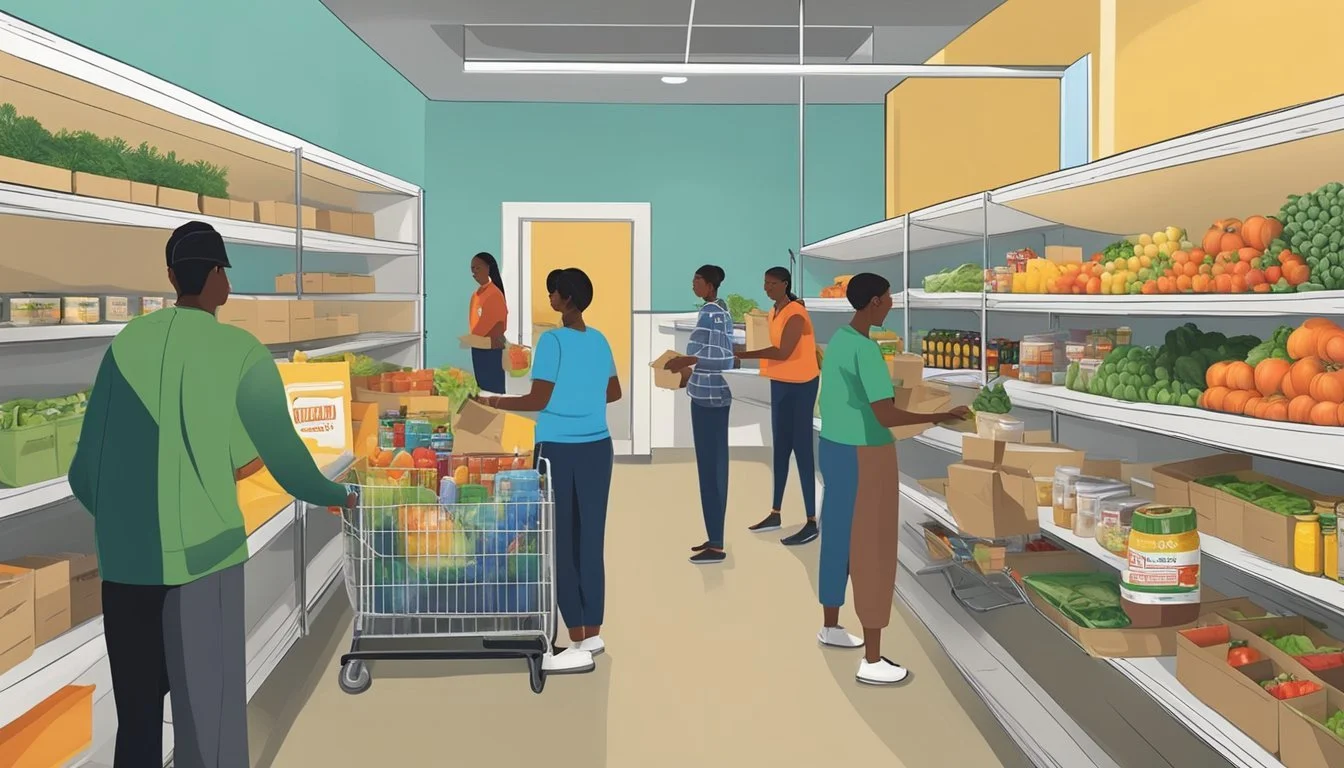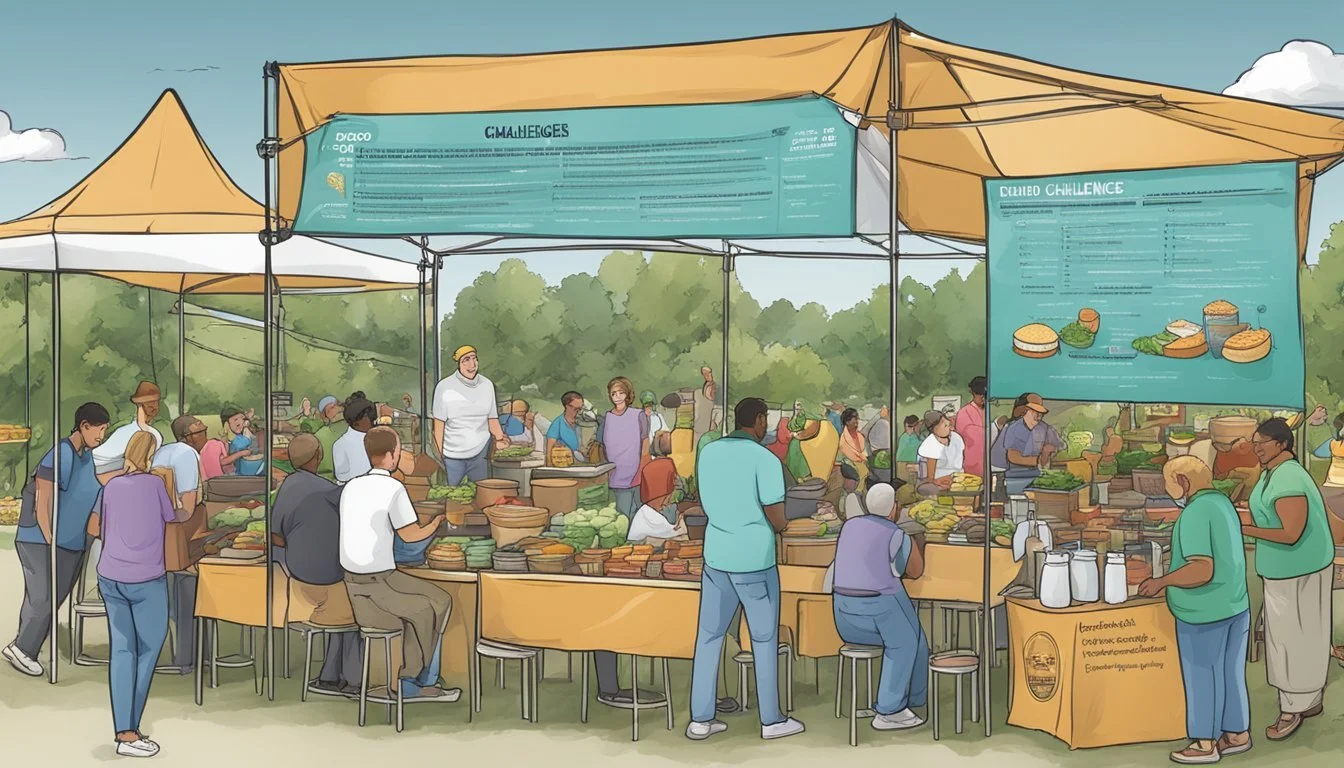Georgia Food Challenges
Ultimate Guide to Epic Eating Contests
Georgia has become a hotspot for those with a hearty appetite and a competitive spirit, as food challenges have peppered the state, attracting both locals and visitors alike. These challenges are as diverse as Georgia's cultural landscape, ranging from mountainous heaps of barbeque to vast oceans of spicy pho. Participants pit their stomachs and determination against colossal portions, with the promise of not only a free meal but also local fame and sometimes even cash prizes.
Food challenges in Georgia are not just about quantity; they are a rich part of the dining experience, offering a playful interaction with food that goes beyond the normative dining experience. As contenders take on these gastronomic feats, they are diving into more than just oversized plates; they are immersing themselves in a communal activity that celebrates culinary excesses and the joy of good food. These contests are not for the faint of heart, nor for those with a small appetite, but they stand as a testament to the fun and indulgence that can be found in Georgia's food scene.
Overview of Georgia Food Challenges
Georgia's food challenges are a testament to the state's adventurous spirit and love for hearty meals. These contests not only provide entertainment but also highlight Georgia's diverse culinary offerings, from Atlanta's urban eateries to Athens' local joints.
Historical Context
In Georgia, the tradition of food challenges dates back to community festivals and local competitions. Today, it has evolved into organized events that often test the limits of one's appetite. Atlanta serves as a hotspot for such spectacles, with contests that have gathered both local and national attention. For instance, the Waffle House World Waffle Eating Championship has been a notable event with its competitive spirit drawing participants from various locations.
Key Characteristics
Food challenges in Georgia typically feature oversized portions and a set time limit for completion. Success may yield prizes like a free meal, monetary rewards, or branded merchandise. Many establishments across Georgia, including those in Atlanta and Athens, offer such challenges year-round. For example, one can attempt a 6-pound pho in Atlanta. These challenges not only underscore the generous Southern portions but also reflect a unique facet of state culture, emphasizing communal engagement and individual prowess.
Major Food Challenges in Georgia
Georgia's culinary landscape offers adventurous foodies a chance to test their mettle with various food challenges. From towering burgers to intense spicy wings, these challenges are designed for those with a hearty appetite and a competitive spirit.
The Beast at Atlanta, GA
Atlanta houses The Beast, a burger challenge that is as daunting as it is delicious. Participants must tackle a massive burger within a set time limit, testing both speed and endurance.
Fat Ass Muff Challenge at Big Easy Grille
Over at Big Easy Grille, the Fat Ass Muff Challenge awaits those craving a taste of New Orleans. Finish their generous muffuletta sandwich, and you can earn bragging rights along with other potential rewards.
Bone Lick BBQ's Pho King Challenge
Bone Lick BBQ presents the Pho King Challenge, where finishing a 6-pound pho brimming with broth, meat, and noodles in one hour wins you a free meal, a t-shirt, and Wall Of Fame status for those who conquer.
Bearfoot Tavern's Bear Mace Wing Challenge in Southeast
Lastly, Bearfoot Tavern tempts spice lovers with the Bear Mace Wing Challenge. Contestants have to face off against 12 of their spiciest wings, a trial by fire for even the bravest of taste buds.
Health Concerns and Nutritional Awareness
Georgia faces significant health challenges linked to nutrition, with food insecurity and obesity being central issues. Awareness and understanding of these matters are essential to fostering healthier communities.
Effects of Unhealthy Eating Challenges
Unhealthy eating habits in Georgia contribute to a range of health concerns, including high rates of obesity, diabetes, and heart disease. Notably, 16.9% of Georgia households face food insecurity, which often correlates with limited access to healthy produce and a reliance on less nutritious food options. This lack of balanced nutrition can exacerbate chronic health conditions and underscore the need for increased nutritional awareness.
Prevalence of Diabetes: A diet heavy in processed and high-sugar foods increases the risk of developing type 2 diabetes, a significant health threat.
Impact on Children: Food insecurity affects 20.9% of Georgia's children, who may face obstacles to proper physical and cognitive development without regular access to nutritious meals.
Balancing Fun and Health
Encouraging a balanced lifestyle that allows for enjoyment while maintaining a focus on health is key. This includes the integration of free meal programs that provide access to healthy food options for those in need and educational initiatives that promote a thorough understanding of sound nutrition practices.
Nutritional Education: Schools and community programs work diligently to increase nutritional awareness, teetering the scales towards informed food choices.
Access to Healthy Options: Making fresh produce more accessible, alongside other healthful foods, is vital in shifting eating habits from unhealthy to healthful.
Supporting Local Food Banks and Pantries
Local food banks and pantries, such as the Atlanta Community Food Bank and Athens Community Council on Aging, play a critical role in addressing food insecurity and providing nutrition to communities. Through the support of volunteers and donations, they tackle poverty by distributing essential food supplies to those in need.
Atlanta Community Food Bank Initiatives
The Atlanta Community Food Bank actively streamlines food distribution with a vast network of more than 2,000 partner pantries and agencies across the state. By coordinating these efforts, they distribute millions of pounds of food each year. Volunteers form the backbone of their operations, offering their time and skills to efficiently manage the logistics of inventory, sorting, and delivery. A notable initiative is the push towards not only ending hunger but also improving nutritional outcomes by focusing on healthy food options.
Athens Community Council on Aging
In the pursuit of promoting food security among the elderly, the Athens Community Council on Aging undertakes specialized programs. They concentrate on addressing the unique nutritional requirements of seniors, ensuring they have access to age-appropriate and nutrient-rich foods. The Council significantly relies on community involvement, with local volunteers dedicating time to manage food drives and meal distribution, reflecting a strong community approach to eradicating food-related challenges in older populations.
Community Involvement and Impact
Community efforts in Georgia have been essential in combating food insecurity, especially among children and seniors, and the COVID-19 pandemic has galvanized unique responses from various organizations and volunteers.
Engaging Children and Families
In Georgia, initiatives aimed at reducing hunger have placed a strong emphasis on engaging children and families. One such example is Wholesome Wave Georgia, which received a significant grant translating into millions of dollars in economic input and providing crucial access to nutritious food for families. Their programs have resulted in making healthy, local produce more accessible throughout the community, thereby directly supporting both the economy and the well-being of those who are food insecure.
Response to COVID-19 Pandemic
The COVID-19 pandemic has exacerbated food insecurity issues, increasing the need for community intervention. Organizations like Meals by Grace stepped up to this challenge, distributing food to over 100 families on a weekly basis. This level of response required a massive mobilization of volunteers for various tasks, from packing to distribution. The pandemic also necessitated new safety protocols, ensuring that volunteers and the food insecure population they serve, which includes a significant number of seniors, could interact safely during these crisis times.
Organizations have had to innovate rapidly to sustain their operations amid the constraints of the pandemic, and Georgia has seen a concerted effort from its communities to prevent hunger from deepening during this crisis.
Economic Aspects of Food Challenges
The economic landscape of Georgia's food sector presents both challenges and opportunities, particularly in terms of local business prospects and the logistics of food distribution and public transportation.
Local Business and Economic Opportunities
In Georgia, the agricultural sector significantly contributes to the local economy, with a notable $9.6 billion in agricultural cash receipts in 2021. Economic opportunities abound in the cultivation and sale of Georgia's top commodities such as broilers, cotton, and peanuts. However, these opportunities are frequently hindered by external pressures including supply chain disruptions and global economic events. For instance, North Georgia farmers are striving to navigate these complexities while also looking to innovate and find new markets to end hunger and bolster the local economy.
Food Distribution and Public Transportation
The state's food distribution network is a pivotal factor in the economic stability of Georgia's food sector. Efficient distribution channels are critical, particularly for reaching the 1 in 8 Georgians facing food insecurity. Policies aimed at supporting food distribution can alleviate some of the strain on foodbanks and nonprofits, as seen during periods of high inflation, which exacerbate the challenges at Georgia's food pantries. Moreover, public transportation plays an important role in this ecosystem, enabling both the workforce involved in food logistics and consumers—especially in rural areas—to access food sources and markets effectively. A focus on enhancing public transportation systems can support wider-access food distribution efforts, ultimately contributing to the goal to end hunger throughout the state.
The Social Aspect of Food Challenges
Food challenges offer more than just a test of one's eating capabilities; they foster community engagement and heighten awareness around various issues or causes.
Eating Contests and Social Engagement
Eating contests are inherently social events, drawing crowds and encouraging camaraderie among participants and onlookers. Challenges such as those offering a free meal or significant gift card for completing a daunting amount of food in a set time frame, often result in participants earning their spot on a Wall of Fame. This public recognition not only serves as an incentive for individuals to participate but transforms the challenge into a communal spectacle. Participants share their experiences on social media, further broadening the social reach and engaging a wider audience.
Attractiveness of Competitions: Competitive eaters and food enthusiasts often find these challenges tempting.
Social Media Impact: Posts, hashtags, and live videos amplify the event's visibility.
Building Awareness through Challenges
While food challenges entertain, they also play a pivotal role in building awareness about issues such as food insecurity or the importance of nutritious food. Organizers sometimes align challenges with charitable causes or educational campaigns, creating an opportunity for participants and spectators to contribute to a larger social good. For instance, aligning a food challenge with a food bank benefits can highlight the struggle against hunger, using the platform to connect fun with fundraising and informational efforts.
Educational Outreach: Informing audiences about food-related issues.
Connections to Charity: Linking challenges with charitable actions or donations.
By engaging the public through these entertaining yet meaningful events, food challenges contribute to a broader social narrative, promoting not only indulgence but also camaraderie, charitable giving, and social awareness.
Rules and Regulations of Food Challenges
Food challenges in Georgia are subject to specific rules and regulations to ensure safety and fairness. There are important legal considerations, and the involvement of judges is crucial for maintaining accountability.
Safety and Legal Considerations
Food challenges must adhere to the current Georgia Food Service Rules and Regulations. Establishments offering challenges must ensure safety nets such as appropriate first aid in case of emergencies and adherence to food safety protocols to prevent foodborne illnesses. Legal considerations include obtaining necessary permits and ensuring challenges do not contravene health codes or consumer protection laws.
Role of Judges and Accountability
The role of judges in food challenges is to oversee the event, ensure compliance with the established rules, and maintain a level of accountability for both participants and hosts. They verify that the challenge is conducted fairly and that the rules and regulations are followed, including time limits and portion sizes. Judges' decisions are final, adding a layer of integrity to the competition.








